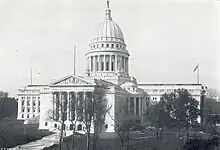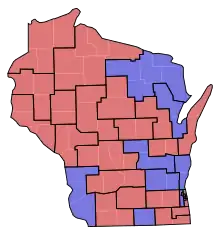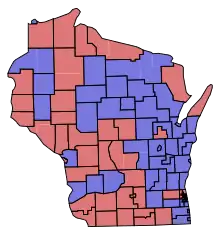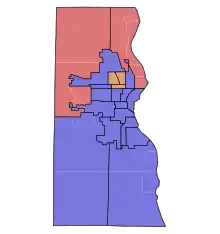| 61st Wisconsin Legislature | |||||
|---|---|---|---|---|---|
| |||||
 Wisconsin State Capitol ca.1915 | |||||
| Overview | |||||
| Legislative body | Wisconsin Legislature | ||||
| Meeting place | Wisconsin State Capitol | ||||
| Term | January 2, 1933 – January 7, 1935 | ||||
| Election | November 8, 1932 | ||||
| Senate | |||||
| Members | 33 | ||||
| Senate President | Thomas J. O'Malley (D) | ||||
| President pro tempore | Orland S. Loomis (R) | ||||
| Party control | Republican | ||||
| Assembly | |||||
| Members | 100 | ||||
| Assembly Speaker | Cornelius T. Young (D) | ||||
| Party control | Democratic | ||||
| Sessions | |||||
| |||||
| Special sessions | |||||
| |||||
The Sixty-First Wisconsin Legislature convened from January 11, 1933, to July 25, 1933, in regular session, and reconvened in a special session from December 11, 1933, to February 3, 1934.[1]
This was the first legislative term after the redistricting of the Senate and Assembly according to an act of the previous session—although there are barely any changes from the previous map. This was also the first legislative term since 1893–1894 in which the Democratic Party of Wisconsin held a majority of one of the chambers. This session also coincided with the formal schism of the Wisconsin Progressive Party from the Republican Party of Wisconsin. It was the beginning of a major political realignment in the state.
Senators representing even-numbered districts were newly elected for this session and were serving the first two years of a four-year term. Assembly members were elected to a two-year term. Assembly members and even-numbered senators were elected in the general election of November 8, 1932. Senators representing odd-numbered districts were serving the third and fourth year of a four-year term, having been elected in the general election of November 4, 1930.[1]
Major events
- January 2, 1933: Inauguration of Albert G. Schmedeman as the 28th Governor of Wisconsin. The first Democratic governor of Wisconsin in 38 years.
- January 23, 1933: The Twentieth Amendment to the United States Constitution, moving the start of the congressional terms from March to January and moving the presidentual inauguration to January 20, was ratified by the requisite number of states to come into force.
- January 30, 1933: Adolf Hitler was appointed Chancellor of Germany by German president Paul von Hindenburg.
- February 15, 1933: Giuseppe Zangara attempted to assassinate U.S. president-elect Franklin D. Roosevelt in Miami, but missed and killed Chicago mayor Anton Cermak.
- February 20, 1933: The United States Congress passed the Blaine Act, named for Wisconsin's outgoing United States senator John J. Blaine, referring to the states the Twenty-first Amendment to the United States Constitution to repeal the Eighteenth Amendment (Prohibition).
- February 27, 1933: The German Reichstag building burned.
- March 4, 1933: Inauguration of Franklin D. Roosevelt as the 32nd President of the United States.
- March 27, 1933: The Empire of Japan announced it would withdraw from the League of Nations.
- April 5, 1933: U.S. President Franklin Roosevelt established the Civilian Conservation Corps by executive order, utilizing the recently passed Emergency Conservation Work Act.
- May 27, 1933: U.S. President Franklin Roosevelt signed into law the Securities Act of 1933, establishing critical new regulation of securities trading.
- June 16, 1933: U.S. President Franklin Roosevelt signed into law the National Industrial Recovery Act of 1933.
- June 21, 1933: The Nazi government in Germany outlawed all other political parties.
- October 10, 1933: A bomb destroyed United Air Lines Trip 23 in air near Chesterton, Indiana. It was the first proven case of sabotage in civil aviation, no perpetrator was ever identified.
- October 14, 1933: Nazi Germany announced it would withdraw from the League of Nations.
- October 17, 1933: Albert Einstein arrived in the United States as a refugee from Nazi Germany.
- November 16, 1933: The United States and the Soviet Union established formal diplomatic relations.
- December 5, 1933: The Twenty-first Amendment to the United States Constitution, repealing the language allowing prohibition of alcohol, was ratified by the requisite number of states to come into force.
- January 30, 1934: U.S. President Franklin Roosevelt signed into law the Gold Reserve Act, nationalizing the gold supply in order to stabilize currency value.
- April 15, 1934: Wisconsin Supreme Court justice Walter C. Owen died in office.
- May 19, 1934: At a convention in Fond du Lac, Wisconsin, the Wisconsin Progressive Party was established.
- August 2, 1934: German president Paul von Hindenburg died of lung cancer. Due to a law passed the previous day, the office of president was abolished and its powers passed to the chancellor of Germany, Adolf Hitler, under the new title Führer und Reichskanzler.
- November 6, 1934: 1934 United States general election:
- Philip La Follette (P) elected Governor of Wisconsin.
- Robert M. La Follette Jr. (P) re-elected United States senator from Wisconsin.
- Wisconsin voters ratified an amendment to the state constitution making technical changes to the section on suffrage, eliminating references to gender.
- November 15, 1934: Wisconsin governor Albert G. Schmedeman appointed Theodore G. Lewis to the Wisconsin Supreme Court to succeed the deceased justice Walter C. Owen.
- November 20, 1934: Retired U.S. Marine Corps general Smedley Butler revealed to Congress a conspiracy of several wealthy businessmen to initiate a fascist coup in the United States.
- December 5, 1934: Recently appointed Wisconsin Supreme Court justice Theodore G. Lewis died in office.
- December 29, 1934: Japan renounced the Washington Naval Treaty and London Naval Treaty, which had set limits on naval warships.
- December 31, 1934: Wisconsin governor Albert G. Schmedeman appointed Joseph Martin to the Wisconsin Supreme Court to succeed the deceased justice Theodore G. Lewis.
Major legislation
- January 28, 1933: Joint Resolution ratifying an amendment to the Constitution of the United States fixing the commencement of the terms of President and Vice President and Members of Congress and fixing the time of the assembling of Congress, 1933 Joint Resolution 5. Wisconsin's ratification of the Twentieth Amendment to the United States Constitution.
- May 4, 1933: Joint Resolution to amend section 11 of article XIII of the constitution relating to free passes, 1933 Joint Resolution 63. First legislative passage of a proposed amendment to the state constitution to create exceptions to the prohibition on free passes for candidates where they are earning less than $300 of income and would otherwise receive such passes from their employer. This amendment was eventually ratified by voters at the November 1936 election.
- June 8, 1933: Joint Resolution to amend section 1 of Article III of the constitution, relating to suffrage, to eliminate obsolete provisions and to submit this amendment to a vote of the people at the general election in November 1934, 1933 Joint Resolution 76. Second legislative passage of a proposed amendment to the state constitution to make technical fixes to the section on suffrage, eliminating references to gender. This amendment was ratified by voters at the November 1934 election.
Party summary
Senate summary

| Party (Shading indicates majority caucus) |
Total | |||||
|---|---|---|---|---|---|---|
| Dem. | Soc. | Prog. | Rep. | Vacant | ||
| End of previous Legislature | 1 | 2 | 0 | 29 | 32 | 1 |
| Start of Reg. Session | 9 | 1 | 0 | 23 | 33 | 0 |
| From July 28, 1934[note 1] | 22 | 32 | 1 | |||
| From Nov. 14, 1934[note 2] | 21 | 31 | 2 | |||
| Final voting share | 32.26% | 67.74% | ||||
| Beginning of the next Legislature | 14 | 0 | 13 | 6 | 33 | 0 |
Assembly summary

| Party (Shading indicates majority caucus) |
Total | ||||||
|---|---|---|---|---|---|---|---|
| Dem. | Soc. | Prog. | Rep. | Vacant | |||
| End of previous Legislature | 3 | 9 | 0 | 84 | 96 | 4 | |
| Start of Reg. Session | 59 | 3 | 0 | 38 | 100 | 0 | |
| From Jan. 28, 1934[note 3] | 58 | 99 | 1 | ||||
| Final voting share | 58.59% | 41.41% | |||||
| Beginning of the next Legislature | 35 | 3 | 45 | 17 | 100 | 0 | |
Sessions
- Regular session: January 11, 1933 – July 25, 1933
- December 1933 special session: December 11, 1933 – February 3, 1934
Leaders
Senate leadership
- President of the Senate: Thomas J. O'Malley (D)
- President pro tempore: Orland S. Loomis (R–Mauston)
Assembly leadership
Members
Members of the Senate
Members of the Senate for the Sixty-First Wisconsin Legislature:[2]

Members of the Assembly
Members of the Assembly for the Sixty-First Wisconsin Legislature:[2]


Committees
Senate committees
- Senate Standing Committee on Agriculture and Labor – C. Shearer, chair
- Senate Standing Committee on Committees – W. H. Edwards, chair
- Senate Standing Committee on Contingent Expenditures – B. Gettelman, chair
- Senate Standing Committee on Corporations and Taxation – O. Morris, chair
- Senate Standing Committee on Education and Public Welfare – W. H. Hunt, chair
- Senate Standing Committee on Highways – J. E. Cashman, chair
- Senate Standing Committee on the Judiciary – H. J. Severson, chair
- Senate Standing Committee on Legislative Procedure – O. S. Loomis, chair
- Senate Standing Committee on State and Local Government – M. F. White, chair
- Senate Special Committee on Building and Loan Association Legislation – H. W. Griswold, chair
- Senate Special Committee on Investigation of Grain and Warehouse Commission – M. G. Kelly, chair
- Senate Special Committee on Mortgage Foreclosures – O. S. Loomis, chair
Assembly committees
- Assembly Standing Committee on Agriculture – H. A. Martin, chair
- Assembly Standing Committee on Commerce and Manufactures – P. F. Daugs, chair
- Assembly Standing Committee on Conservation – G. Bliese, chair
- Assembly Standing Committee on Contingent Expenditures – W. J. Dolan, chair
- Assembly Standing Committee on Education – E. F. Rakow, chair
- Assembly Standing Committee on Elections – J. M. Theisen, chair
- Assembly Standing Committee on Engrossed Bills – A. J. Opachen, chair
- Assembly Standing Committee on Enrolled Bills – M. Weinberg, chair
- Assembly Standing Committee on Excise and Fees – L. Leidiger, chair
- Assembly Standing Committee on Highways – W. G. Caldwell, chair
- Assembly Standing Committee on Insurance and Banking – B. Mau, chair
- Assembly Standing Committee on the Judiciary – J. F. Fox, chair
- Assembly Standing Committee on Labor – A. J. Balzer, chair
- Assembly Standing Committee on Municipalities – M. Galasinski, chair
- Assembly Standing Committee on Printing – W. D. Leary, chair
- Assembly Standing Committee on Public Welfare – M. O. Kryszak, chair
- Assembly Standing Committee on Revision – W. P. Grimes, chair
- Assembly Standing Committee on Rules – H. E. Krueger, chair
- Assembly Standing Committee on State Affairs – F. Chermak, chair
- Assembly Standing Committee on Taxation – E. Moldenhauer, chair
- Assembly Standing Committee on Third Reading – J. E. Russell, chair
- Assembly Standing Committee on Transportation – I. C. Evans, chair
- Assembly Special Committee on Building and Loan Association Legislation – W. D. Leary, chair
Joint committees
- Joint Standing Committee on Finance – O. Mueller (Sen.) & J. C. Hamata (Asm.), co-chairs
- Joint Special Committee on Additional Farm Lands for State Prison – O. Mueller, chair
- Joint Special Committee on Farm Machinery Prices – H. J. Severson, chair
- Joint Special Committee on Huber Memorial Exercises – J. E. Cashman, chair
- Joint Special Committee on Investigation of the Department of Agriculture and Markets – G. E. Ingram, chair
- Joint Special Committee on Investigation of the Quality and Price of Beer – M. G. Kelly, chair
- Joint Special Committee on Reduction in Cost of Government – E. A. Clifford, chair
- Joint Special Committee on Small Loans Lobbying – H. W. Bolens, chair
- Joint Special Committee on Sources of Revenue for School Purposes – B. Gettelman, chair
- Joint Special Committee on Stabilization of Milk Prices – B. J. Gehrmann, chair
- Joint Special Committee on State Fair for 1933 – W. Shenners, chair
Employees
Senate employees
- Chief Clerk: Robert A. Cobban[2]
- Assistant Chief Clerk: C. J. Knoche
- Sergeant-at-Arms: Emil A. Hartman
- Assistant Sergeant-at-Arms: Norman J. Hippert
- Postmaster: William H. Kasiska
Assembly employees
- Chief Clerk: John J. Slocum[2]
- Sergeant-at-Arms: George C. Faust
- Assistant Sergeant-at-Arms: John E. Rohan
- Postmaster: James Carew
Changes from the 60th Legislature
New districts for the 61st Legislature were defined in 1931 Wisconsin Special Session Act 27, passed into law in the 60th Wisconsin Legislature.
Senate redistricting
Summary of Senate changes
- 26 districts were left unchanged
- Milwaukee's 7 districts were slightly reconfigured without losing their geographic position within the county.
Assembly redistricting
Summary of Assembly changes
- 74 districts were left unchanged
- Two of Dane County's districts were slightly adjusted.
- Kenosha County's 2 districts were slightly adjusted.
- Marathon County's 2 districts were reconfigured.
- Milwaukee County's 20 districts were reconfigured.
Notes
- ↑ Republican Merritt F. White (19th District) died.
- ↑ Republican Fred W. Zantow (27th District) died.
- ↑ Democrat Walter G. Caldwell (Waukesha County) died.
References
- 1 2 Barish, Lawrence S.; Lemanski, Lynn, eds. (2021). "Historical Lists" (PDF). State of Wisconsin Blue Book 2021–2022 (Report). Wisconsin Legislative Reference Bureau. pp. 468, 471, 475, 479–480. ISBN 978-1-7333817-1-0. Retrieved March 11, 2023.
- 1 2 3 4 Witte, Edwin E.; Kelly, Alice, eds. (1931). "Legislative Branch of the State Government". The Wisconsin Blue Book 1933 (Report). Wisconsin Legislative Reference Library. pp. 191–260. Retrieved July 29, 2023.